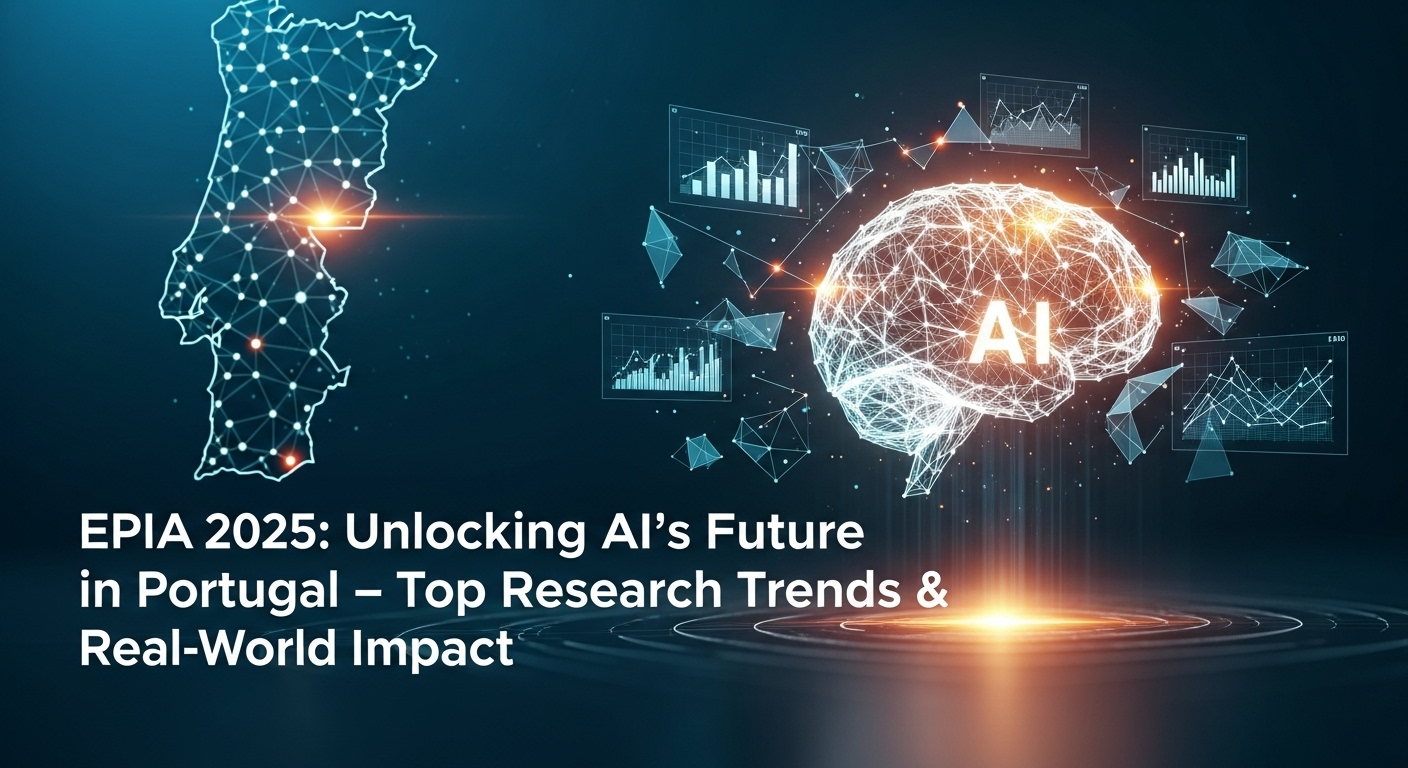AI研究の未来を拓く3日間:EPIA 2025国際会議がポルトガルで盛況裏に閉幕
2025年10月1日から3日にかけ、ポルトガルのアルガルヴェ大学ファロにて、AI(人工知能)分野における最先端の研究と応用を議論する国際会議「EPIA 2025」(第24回EPIA人工知能国際会議)が開催されました。ポルトガル人工知能協会(APPIA)の主催のもと、世界中のAIリーダー、研究者、エンジニア、専門家が一堂に会し、理論的基盤から実世界への応用まで、幅広いテーマで活発な議論が交わされました。
EPIA 2025が探求したAIの多岐にわたる側面
EPIA会議の目的は、AIのあらゆる分野における研究を推進し、理論的および基礎的な問題から応用までを網羅し、関連分野の研究者、エンジニア、実務家間の科学的交流を促進することです。 今年も多様なテーマ別トラックが設けられ、AIの進化が社会にもたらす影響について深く掘り下げられました。特に注目されたのは、今日のAI研究の最前線を象徴する以下の分野です。
- 生成AI:基盤と応用:GANs、VAEs、Transformerベースモデルなどの深層学習アーキテクチャを含む生成モデルの進歩と、ヘルスケア、クリエイティブ産業、自然言語処理、科学的発見といった多様な分野への影響が議論されました。
- AIにおける倫理と責任:生成AIにおけるバイアスの軽減、透明性、知的財産権の問題、合成コンテンツ生成が社会に与える影響など、倫理的課題が多角的に検討されました。
- AIと法:AIが法制度に与える影響、特にデータの収集、保持、管理に根ざした法的・技術的・倫理的課題について、人間の自律性、自己決定、責任に与える影響を含めて議論されました。
- 産業と社会のためのAI:製造業、エネルギーシステム、交通システムなど、さまざまな産業におけるAIの具体的な応用事例やその可能性が紹介されました。
- AIと創造性、医療、建築、工学:AIが創造的なプロセス、医療診断、建築設計、歴史的建造物の保存といった分野にどのように貢献できるかについても、多くの発表がありました。
議論の場としてのEPIA 2025
会議は、各テーマトラックごとの並行セッションに加え、著名な科学者による招待講演を含む全体セッション、活発な討論会、そして交流を深めるためのソーシャルイベントで構成されました。 これは、特定のAIサブエリア内の研究者間でアイデアの活発な交換を促進するための環境を提供することを意図しています。 Paolo Torroni氏、Frans A. Oliehoek氏、Mário Figueiredo氏といった基調講演者が登壇し、それぞれの専門分野における最新の洞察と将来の展望を共有しました。
研究成果と今後の展望
EPIA 2025で採択された論文は、SpringerのLNAI(Lecture Notes in Artificial Intelligence)シリーズとして会議議事録に掲載され、Thomson Reuters ISI Web of Science、Scopus、DBLP、Google Scholarにインデックスされる予定です。 これは、発表された研究が学術界で広く認識され、今後のAI研究の発展に大きく貢献することを示しています。
プラチナスポンサーであるEmpowered Startups社をはじめ、多くの企業や団体がこの会議を支援しており、AI研究とイノベーションの推進に対する強いコミットメントが示されました。 EPIA 2025は、AIが私たちの社会に与える影響の大きさを再認識させるとともに、その可能性を最大限に引き出すための協力と議論の重要性を浮き彫りにしました。この3日間の議論が、次世代のAI技術と応用開発に向けた新たなインスピレーションとなることでしょう。
EPIA 2025: Charting the Course for AI’s Next Decade in Faro, Portugal
From October 1st to 3rd, 2025, the picturesque city of Faro, Portugal, becomes the epicenter of artificial intelligence innovation as it hosts the 24th EPIA International Conference on Artificial Intelligence (EPIA 2025). Hosted with the patronage of the Portuguese Association for Artificial Intelligence (APPIA), this well-established European conference is a crucial gathering for AI leaders, researchers, engineers, and specialists worldwide. Its core mission is to promote cutting-edge research across all facets of AI, spanning both theoretical foundations and transformative real-world applications, while fostering vital scientific exchange among professionals.
A Deep Dive into the Future of AI Research
EPIA 2025 is structured around a diverse array of thematic tracks designed to facilitate in-depth discussions and breakthroughs in specific sub-areas of AI. Attendees can anticipate parallel sessions, insightful plenary lectures delivered by leading scientists, engaging discussion panels, and valuable networking events.
The conference program promises a comprehensive exploration of the AI landscape, touching upon critical emerging trends and established domains. Key research areas and applications to be discussed include, but are not limited to:
- Generative AI: Focusing on both its foundational principles and expansive applications across industries. This track highlights the burgeoning field of AI systems capable of creating new content.
- AI and Creativity: Exploring the intersection of artificial intelligence with artistic and innovative endeavors, from visual arts to music and narrative generation.
- Ethics and Responsibility in AI: Addressing the crucial societal implications, ethical frameworks, and responsible development of AI technologies.
- Natural Language Processing (NLP), Text Mining and Applications: Delving into how AI understands, interprets, and generates human language.
- Knowledge Representation and Reasoning: Examining how AI systems can model and infer knowledge to make intelligent decisions.
AI in Action: Real-World Applications Transforming Industries
Beyond theoretical discussions, EPIA 2025 places a strong emphasis on AI’s practical impact across various sectors. Thematic tracks dedicated to real-world applications underscore AI’s role in driving innovation and efficiency:
- Artificial Intelligence in Medicine (AIM): Showcasing advancements in diagnostics, treatment planning, and personalized healthcare.
- AI for Industry and Societies (AI4IS): Addressing the integration of AI in manufacturing, logistics, smart cities, and societal challenges.
- Artificial Intelligence and IoT in Agriculture (AIoTA): Investigating smart farming solutions, crop optimization, and sustainable agricultural practices.
- AI in Power and Energy Systems (AIPES): Exploring AI’s contribution to optimizing energy grids, renewable energy management, and consumption efficiency.
- Artificial Intelligence in Transportation Systems (AITS): Covering intelligent traffic management, autonomous vehicles, and smart mobility solutions.
A Global Hub for Collaboration and Breakthroughs
The conference serves as a vibrant platform for researchers and practitioners to present their high-quality, unpublished work, with accepted papers slated for publication in Springer’s esteemed Lecture Notes in Artificial Intelligence (LNAI) series. These proceedings are widely indexed in databases such as Thomson Reuters ISI Web of Science, Scopus, DBLP, and Google Scholar, ensuring broad dissemination of cutting-edge research.
With prominent keynote speakers like Paolo Torroni, Frans A. Oliehoek, and Mário Figueiredo, EPIA 2025 is poised to inspire and challenge perspectives, solidifying its role as a key event in the global AI calendar. For anyone invested in the rapidly evolving world of artificial intelligence, EPIA 2025 in Faro, Portugal, offers an unparalleled opportunity to engage with the latest trends, applications, and the brightest minds shaping our intelligent future.



